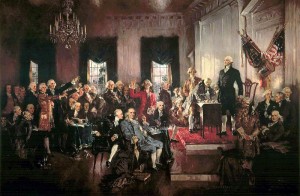In the February 7, 2011 edition of The Nation, Garrett Epps argues that the political right is trying to steal the United States Constitution “in plain sight,” and that it’s time to take it back because it belongs to all of us. His article is titled “Stealing the Constitution: Inside the right’s campaign to hijack our country’s founding text–and how to fight back.” Epps argues that it’s time to counteract the “poisonous rubbish” that the far right’s self-appointed constitutional “experts” are teaching well-meaning citizens. One of those “experts” of the far right is United States Supreme Court Justice Antonio Scalia, who has just agreed to serve as a faculty member for Michele Bachmann’s new “Constitutional School” for new members of Congress.
How has the political right been able to successfully portray itself to be the only party that can meaningfully define the Constitution? One big reason is that legitimate constitutional scholars are unwilling to step into the fray in a public way. Instead,
Scholars from top schools hold forth with polysyllabic series of hermeneutics that ordinary citizens can’t fathom. Meanwhile, conservatives don’t hesitate to speak directly to the public-and, often, to dumb down the Constitution. They purvey a simple method: anyone who doesn’t support the far right version of the Constitution is at best unpatriotic, at worst a traitor.
In his excellent article, Epps, a law professor at the University of Baltimore, presents a series of falsehoods being presented by the political right.
Falsehood One: the Constitution was set up to restrain the federal government. Epps disagrees. The document is much more concerned with powers the federal government can’t assert, including levying taxes, raising armies, making wars, and setting rules of commerce. One only need to examine the history to see that the old articles of the Confederation failed because they required the federal government to “big states from money and recommend laws for them to enact.” The new bicameral Congress gives the federal government a “long and impressive list of textual powers”:
To make all laws which shall be necessary and proper for carrying into execution,” not only those specific powers but “all other powers vested by this Constitution in the government of the United States, or in any department or officer thereof.”
Epps concludes that this is “a lot of power.”
Falsehood Two: the Constitution was created to protect the states from federal power. The limits in the Constitution, however, or mostly limits on state governments. Further “the idea that states have rights, or that they are sovereign, appears nowhere in the original Constitution.” 
Falsehood Three: it is improper to consider international law while interpreting the Constitution. Epps states that this is a “mutilation” of the Constitution. “The framers knew a great deal of international law,” and it “itself mentions many sources of international law.”
Falsehood Four: The Constitution is not a living document. To the contrary, the Constitution was written to be “a set of rules by which living people could solve their own problems, not as a dead hand restricting their options. Epps argues that the political right wing believes that the Constitution should function as a “killing jar scientists used to preserve butterflies, freezing the country under glass, preventing social changes and stripping the democratic process of its effectiveness.”
Falsehood Five: there is a “fixed, binding single intent hidden in each phrase of the Constitution.” Epps argues that this “confuses the Constitution with the Bible. He explains that this purported application of original intent exapts the religious fundamentalist notion of “original intent.”
Falsehood Six: Elitists are the enemies of the United States government. This is false because, as Thomas Jefferson wrote, “we are all Federalists, we are all Republicans.” The Constitution itself indicates that Congress has the power to regulate “commerce with foreign nations, and among the several states, and with the Indian tribes.” Epps argues that it is absurd to claim that the reasoning of the framers cannot be brought forward to modern circumstances. It is equally absurd to allow Justice Scalia to baldly claim “Trust me, I know the framers and here’s what they would have said.” Epps takes additional umbrage at Scalia’s concurrence in Citizens United. This frustration with Scalia was articulated in the dissent by Justice John Paul Stevens, who noted that “During the founding . . . most political thinkers distrusted the corporate form of government.” Scalia found this originalist argument unconvincing because conflicted with his ulterior motives. He all too conveniently argued that modern corporations “would probably have been favored by most of our enterprising founders.” The notion of “original intent” is thus a shell game.
[A]n originalist like Scalia is utterly confident about his power to plug the “easy, simple” meaning from the air. By a bizarre coincidence, the “easy, simple” meaning usually coincides with the program of the twenty-first-century judicial right.
Epps urges American citizens to actually read the Constitution (here’s a copy for you). He points out that we won’t find the Tea Party manifesto in the Constitution (nor the agenda of progressive advocacy groups). Rather, it contains “a surprising, indeed sometimes dazzling array of meanings. By turns political, legal, epic and poetic, it shows us a number of strategies for dealing with contemporary challenges.”


The Bible doesn't seem to possess that quality, either.